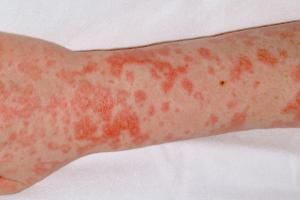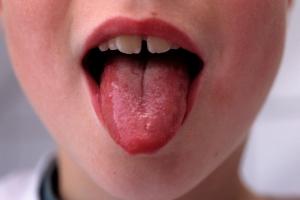Scarlet fever
Scarlet fever, which is caused by the bacteria Group A Streptococcus (Group A Strep), is a bacterial illness that mainly affects children. It causes a distinctive pink-red rash.
Symptoms of scarlet fever
The symptoms of scarlet fever usually take two to five days to appear after infection.
The symptoms include:
- a sore throat
- headache
- high temperature (38.3°C/ 101°F) or above)
- flushed face and swollen tongue
The distinctive pink-red rash develops 12 to 48 hours later.
Rash
Red blotches are the first sign of the rash.
These turn into a fine pink-red rash that feels like sandpaper to touch.
It may also be itchy.
The rash usually starts on the chest and stomach before spreading to other areas of the body, such as the ears and neck.
On darker skin, the rash may be more difficult to see, although its rough texture should be obvious.

The rash doesn't usually spread to the face. However, the cheeks become flushed and the area just around the mouth stays quite pale. The rash will turn white if you press a glass on it.
Outer layers of skin, usually on the hands and feet, may peel for several weeks afterwards.
Other symptoms may include:
- swollen neck glands
- loss of appetite
- nausea or vomiting
- red lines in the folds of the body, such as the armpit, which may last a couple of days after the rash has gone
- a white coating on the tongue, which peels a few days later leaving the tongue red and swollen (this is known as strawberry tongue)
- a general feeling of being unwell
If your child has tonsillitis with a runny nose, it is less likely that they have scarlet fever / Group A Strep.
Most children with Group A Strep throat infection or scarlet fever will get better with antibiotics.
Unfortunately, very occasionally Group A streptococcus can spread to other areas of the body, causing:
- infections in the neck (tonsillar abscesses or lymph node abscesses)
- chest infections (pneumonia)
- bone and joint infections (septic arthritis)
- sepsis
Who’s affected by scarlet fever
Most cases of scarlet fever occur in children under 10 (usually between two and eight years of age).
However, people of any age can get the illness.
The symptoms of scarlet fever will only develop in people susceptible to toxins produced by the Streptococcus bacteria.
Most children over 10 years of age will have developed immunity to these toxins.
It's possible to have scarlet fever more than once, but this is rare.

Treating scarlet fever
Most cases of scarlet fever clear up after about a week without treatment. However, treatment is recommended.
Treatment reduces the length of time you're contagious, speeds up recovery and lowers the risk of complications of scarlet fever.
Scarlet fever is usually treated with a course of antibiotics.
When to seek medical advice
Scarlet fever, which is caused by the bacteria Group A Streptococcus, is usually a mild illness but it is highly infectious.
It is much more common in children than in adults.
It is important that if your child has symptoms of scarlet fever that you should speak to a doctor. They can advise whether they should be started on antibiotics or if they need to be assessed.
Antibiotics are not routinely recommended as a preventative treatment for people who have been in contact with someone with scarlet fever.
Scarlet fever and pregnancy
Catching scarlet fever when pregnant will not put your baby at risk.
However, if you're heavily pregnant, tell the doctors and midwives in charge of your care if you've been in contact with someone who has scarlet fever.
Self care
Many of the symptoms of scarlet fever can be relieved using some simple self care measures, such as:
- drinking plenty of cool fluids
- eating soft foods (if your throat is painful)
- taking paracetamol to bring down a high temperature
- using calamine lotion or antihistamine tablets to relieve itching
Preventing the spread of scarlet fever
Scarlet fever is very contagious.
It is caused by Streptococcus pyogenes bacteria, also known as group A streptococcus, which are found on the skin and in the throat.
If your child has scarlet fever, you should keep them away from nursery or school for at least 24 hours after starting treatment with antibiotics.
Adults with the illness should also stay off work for at least 24 hours after starting treatment.
Children and adults should cover their mouth and nose with a tissue when they cough or sneeze.
They should also wash their hands with soap and water after using or disposing of tissues.
There’s no vaccine for scarlet fever.
Scarlet fever is a notifiable disease.
This means that doctors must report cases to the Director of Public Health so they can monitor the spread of the disease.
More useful links
The information on this page has been adapted from original content from the NHS website.
For further information see terms and conditions.